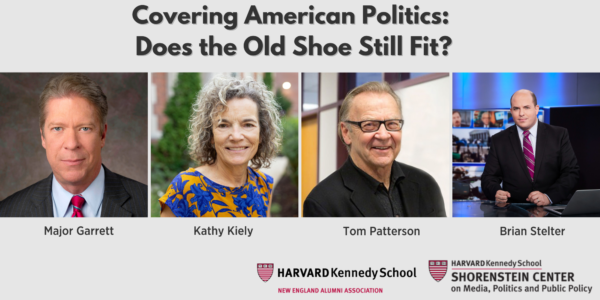American journalists should guard democracy amid election lies and audiences that dismiss facts as bias. But when clickbait generates revenue and politicians are undeterred by the press, how can news media catch up with a changing political landscape?
Three journalists and a professor of government and media studies mined problems facing journalism at a January 25 panel hosted by the Harvard Kennedy School Shorenstein Center. Brian Stelter, who is the Walter Shorenstein Media and Democracy fellow at the Shorenstein Center, introduced the conversation by asking what’s broken about the state of American political journalism.

The upturning of a set of norms accounts for some of the system’s problems, said Kathy Kiely. Chair in Free-Press studies at Missouri School of Journalism, Kiely explained that so many journalists have spent their careers maintaining a neutral stance to talk on many sides of an issue, while for the people they cover, the story is simpler: “You tell the truth, you don’t endanger the country we all live in.”
Expounding on Kiely’s point, Thomas E. Patterson said, “When you have an unchecked deceptive claim paired with a truthful claim, it doesn’t work anymore.” Patterson is Bradlee Professor of Government and the Press at Harvard Kennedy School. He described how confirmation bias leads to a no-win situation for journalists, “as the audiences begin to argue back and say, ‘It isn’t my person that’s lying, it’s the journalist that’s slanting this.’”
Major Garrett brought forward another change in the news landscape, saying, “Let’s talk about power.” Garrett, who is chief Washington correspondent for CBS News and the host of The Takeout podcast, noted how much influence dominant news networks and newspapers had 30 or 40 years ago, reaching more than half of households nationwide every day. Audiences trusted these journalists.
“Politicians feared the power in that market share and in that credibility,” Garrett said. He lamented that politicians no longer fear it, and so operate on their own incentive structures. “Power has been diluted for us, and we are struggling to maintain our place in the conversation.”
The entanglement of over-coverage and sensationalizing with the rapid churn of news gave rise to further complications. Kiely said, “we are clicking on the intellectual equivalent of junk food, and it is causing commercial enterprises, which are news organizations, to give us more.” Garrett remarked that “newness leaves scarce time for deeper reporting. … I believe in the standard, old style, basic forms of journalism. Ask and answer, record, let the audience figure it out for themselves.”
Patterson highlighted the “abysmal” coverage of the classified documents of Donald Trump and Joe Biden. “We’ve got some real problems in this country. Inflation, immigration, and you can go down the list. Well, what’s the top issue? Classified documents.” Patterson chuckled at the implication in some stories that these individuals “pack their own boxes,” saying that similar outlandish claims and misunderstandings call into question if journalists know enough to report accurately. “And when they don’t,” Patterson said, “they become part of the misinformation problem.”
When budgets were fatter, journalists could pursue original, risky stories, Kiely later said. But now outlets repeatedly cover the hot story because it drives clicks. “I tell my students, you’re gonna have to fight to get out from behind that computer, you’re gonna have to fight to talk to real people … a lot of editors would rather you sit there and rewrite the news of the day.”
Coverage of sensational stories comes down to proportionality, according to Patterson. With regards to Hillary Clinton’s emails during the 2016 election and Donald Trump’s tweets during his presidency, journalists have to determine the news value. “If Trump comes back into the arena as a candidate for 2024, I don’t think journalists are obliged to cover everything that he says. And if he utters an untruth, yeah, if you’re gonna report it, maybe you want to say this isn’t quite factual.”
The news media has also turned toxic for journalists. According to Kiely, “Reporters are under attack in terrible ways and social media has become a vector for that attack, and particularly for women and journalists of color.” She has worried students won’t want to come to journalism, but despite the bad pay and hostile environment, Kiely and Patterson both found that young people are still looking to do the work for public service.
Stelter closed by asking what Kiely and Patterson tell their students to inspire them. Patterson said he impresses upon them that they can be changemakers and should think outside themselves. “What can you do to strengthen your community, and who in that community can really benefit from what you can contribute?” Patterson asked.
Kiely agreed, adding that “it’s the most legal fun you can have,” with a license to ask questions and discover anything you want. “We have to find a way to make public service journalism pay again, because if we don’t, we won’t have a democracy.” She finished, addressing young journalists, “We’re giving you the keys to the car. Drive it well.”

